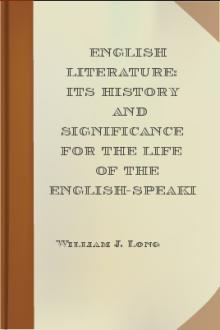English Literature: Its History and Significance for the Life of the English-Speaking World by William J. Long (good books for 8th graders txt) 📕

- Author: William J. Long
- Performer: -
Book online «English Literature: Its History and Significance for the Life of the English-Speaking World by William J. Long (good books for 8th graders txt) 📕». Author William J. Long
Arnold's literary work divides itself into three periods, which we may call the poetical, the critical, and the practical. He had written poetry since his school days, and his first volume, The Strayed Reveller and Other Poems, appeared anonymously in 1849. Three years later he published Empedocles on Etna and other Poems; but only a few copies of these volumes were sold, and presently both were withdrawn from circulation. In 1853-1855 he published his signed Poems, and twelve years later appeared his last volume of poetry. Compared with the early work of Tennyson, these works met with little favor, and Arnold practically abandoned poetry in favor of critical writing.
The chief works of his critical period are the lectures On Translating Homer (1861) and the two volumes of Essays in Criticism (1865-1888), which made Arnold one of the best known literary men in England. Then, like Ruskin, he turned to practical questions, and his Friendship's Garland (1871) was intended to satirize and perhaps reform the great middle class of England, whom he called the Philistines. Culture and Anarchy, the most characteristic work of his practical period, appeared in 1869. These were followed by four books on religious subjects,--St. Paul and Protestantism (1870), Literature and Dogma (1873), God and the Bible (1875), and Last Essays on Church and Religion (1877). The Discourses in America (1885) completes the list of his important works. At the height of his fame and influence he died suddenly, in 1888, and was buried in the churchyard at Laleham. The spirit of his whole life is well expressed in a few lines of one of his own early sonnets:
One lesson, Nature, let me learn of thee,One lesson which in every wind is blown,
One lesson of two duties kept at one
Though the loud world proclaim their enmity--
Of toil unsever'd from tranquillity;
Of labour, that in lasting fruit outgrows
Far noisier schemes, accomplish'd in repose,
Too great for haste, too high for rivalry.
His Poetry.Works of Matthew Arnold. We shall better appreciate Arnold's poetry if we remember two things: First, he had been taught in his home a simple and devout faith in revealed religion, and in college he was thrown into a world of doubt and questioning. He faced these doubts honestly, reverently,--in his heart longing to accept the faith of his fathers, but in his head demanding proof and scientific exactness. The same struggle between head and heart, between reason and intuition, goes on to-day, and that is one reason why Arnold's poetry, which wavers on the borderland between doubt and faith, is a favorite with many readers. Second, Arnold, as shown in his essay on The Study of Poetry, regarded poetry as "a criticism of life under the conditions fixed for such criticism by the laws of poetic truth and poetic beauty." Naturally, one who regards poetry as a "criticism" will write very differently from one who regards poetry as the natural language of the soul. He will write for the head rather than for the heart, and will be cold and critical rather than enthusiastic. According to Arnold, each poem should be a unit, and he protested against the tendency of English poets to use brilliant phrases and figures of speech which only detract attention from the poem as a whole. For his models he went to Greek poetry, which he regarded as "the only sure guidance to what is sound and true in poetical art." Arnold is, however, more indebted than he thinks to English masters, especially to Wordsworth and Milton, whose influence is noticeable in a large part of his poetry.
Of Arnold's narrative poems the two best known are Balder Dead (1855), an incursion into the field of Norse mythology which is suggestive of Gray, and Sohrab and Rustum (1853), which takes us into the field of legendary Persian history. The theme of the latter poem is taken from the Shah-Namah (Book of Kings) of the Persian poet Firdausi, who lived and wrote in the eleventh century.
Sohrab and RustrumBriefly, the story is of one Rustem or Rustum, a Persian Achilles, who fell asleep one day when he had grown weary of hunting. While he slept a band of robbers stole his favorite horse, Ruksh. In trailing the robbers Rustum came to the palace of the king of Samengan, where he was royally welcomed, and where he fell in love with the king's daughter, Temineh, and married her. But he was of a roving, adventurous disposition, and soon went back to fight among his own people, the Persians. While he was gone his son Sohrab was born, grew to manhood, and became the hero of the Turan army. War arose between the two peoples, and two hostile armies were encamped by the Oxus. Each army chose a champion, and Rustum and Sohrab found themselves matched in mortal combat between the lines. At this point Sohrab, whose chief interest in life was to find his father, demanded to know if his enemy were not Rustum; but the latter was disguised and denied his identity. On the first day of the fight Rustum was overcome, but his life was spared by a trick and by the generosity of Sohrab. On the second day Rustum prevailed, and mortally wounded his antagonist. Then he recognized his own son by a gold bracelet which he had long ago given to his wife Temineh. The two armies, rushing into battle, were stopped by the sight of father and son weeping in each other's arms. Sohrab died, the war ceased, and Rustum went home to a life of sorrow and remorse.
Using this interesting material, Arnold produced a poem which has the rare and difficult combination of classic reserve and romantic feeling. It is written in blank verse, and one has only to read the first few lines to see that the poet is not a master of his instrument. The lines are seldom harmonious, and we must frequently change the accent of common words, or lay stress on unimportant particles, to show the rhythm. Arnold frequently copies Milton, especially in his repetition of ideas and phrases; but the poem as a whole is lacking in Milton's wonderful melody.
The classic influence on Sohrab and Rustum is especially noticeable in Arnold's use of materials. Fights are short; grief is long; therefore the poet gives few lines to the combat, but lingers over the son's joy at finding his father, and the father's quenchless sorrow at the death of his son. The last lines especially, with their "passionate grief set to solemn music," make this poem one of the best, on the whole, that Arnold has written. And the exquisite ending, where the Oxus, unmindful of the trivial strifes of men, flows on sedately to join "his luminous home of waters" is most suggestive of the poet's conception of the orderly life of nature, in contrast with the doubt and restlessness of human life.
Miscellaneous PoemsNext in importance to the narrative poems are the elegies, "Thyrsis," "The Scholar-Gipsy," "Memorial Verses," "A Southern Night," "Obermann," "Stanzas from the Grande Chartreuse," and "Rugby Chapel." All these are worthy of careful reading, but the best is "Thyrsis," a lament for the poet Clough, which is sometimes classed with Milton's Lycidas and Shelley's Adonais. Among the minor poems the reader will find the best expression of Arnold's ideals and methods in "Dover Beach," the love lyrics entitled "Switzerland," "Requiescat," "Shakespeare," "The Future," "Kensington Gardens," "Philomela," "Human Life," "Callicles's Song," "Morality," and "Geist's Grave."--the last being an exquisite tribute to a little dog which, like all his kind, had repaid our scant crumbs of affection with a whole life's devotion.
Essays in CriticismThe first place among Arnold's prose works must be given to the Essays in Criticism, which raised the author to the front rank of living critics. His fundamental idea of criticism appeals to us strongly. The business of criticism, he says, is neither to find fault nor to display the critic's own learning or influence; it is to know "the best which has been thought and said in the world," and by using this knowledge to create a current of fresh and free thought. If a choice must be made among these essays, which are all worthy of study, we would suggest "The Study of Poetry," "Wordsworth," "Byron," and "Emerson." The last-named essay, which is found in the Discourses in America, is hardly a satisfactory estimate of Emerson, but its singular charm of manner and its atmosphere of intellectual culture make it perhaps the most characteristic of Arnold's prose writings.
Among the works of Arnold's practical period there are two which may be taken as typical of all the rest. Literature and Dogma (1873) is, in general, a plea for liberality in religion. Arnold would have us read the Bible, for instance, as we would read any other great work, and apply to it the ordinary standards of literary criticism.
Culture and AnarchyCulture and Anarchy (1869) contains most of the terms--culture, sweetness and light, Barbarian, Philistine, Hebraism, and many others--which are now associated with Arnold's work and influence. The term "Barbarian" refers to the aristocratic classes, whom Arnold thought to be essentially crude in soul, notwithstanding their good clothes and superficial graces. "Philistine" refers to the middle classes,--narrow-minded and self-satisfied people, according to Arnold, whom he satirizes with the idea of opening their minds to new ideas. "Hebraism" is Arnold's term for moral education. Carlyle had emphasized the Hebraic or moral element in life, and Arnold undertook to preach the Hellenic or intellectual element, which welcomes new ideas, and delights in the arts that reflect the beauty of the world. "The uppermost idea with. Hellenism," he says, "is to see things as they are; the uppermost idea with Hebraism is conduct and obedience." With great clearness, sometimes with great force, and always with a play of humor and raillery aimed at the "Philistines," Arnold pleads for both these elements in life which together aim at "Culture," that is, at moral and intellectual perfection.
General Characteristics. Arnold's influence in our literature may be summed up, in a word, as intellectual rather than inspirational. One cannot be enthusiastic over his poetry, for the simple reason that he himself lacked enthusiasm. He is, however, a true reflection of a very real mood of the past century, the mood of doubt and sorrow; and a future generation may give him a higher place than he now holds as a poet. Though marked by "the elemental note of sadness," all Arnold's poems are distinguished by clearness, simplicity, and the restrained emotion of his classic models.
As a prose writer the cold intellectual quality, which mars his poetry by restraining romantic feeling, is of first importance, since it leads him to approach literature with an open mind and with the single desire to find "the best which has been thought and said in the world." We cannot yet speak with confidence of his rank in literature; but by his crystal-clear style, his scientific





Comments (0)